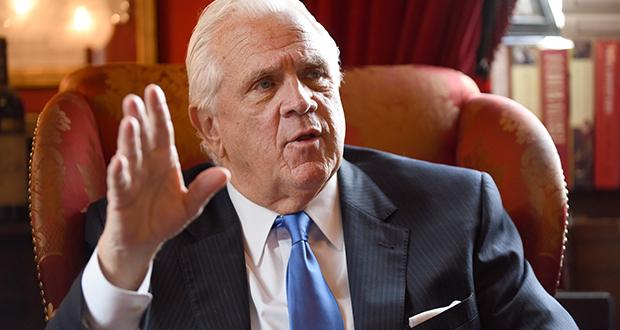Anyone who ever worked in Annapolis the past three decades understood how large a shadow that Senate President Thomas V. “Mike” Miller cast over the political landscape in the state capital. He was the master puppeteer, one of the most powerful Democrats in Maryland.
After the longest stint as president of a state senate in the United States, he resigned his leadership position on Thursday, Oct. 24 due to serious health concerns related to prostate cancer. He will continue as a rank-and-file state senator representing Calvert County.
State politics and the Maryland State Senate will change dramatically. The 76-year-old Miller will yield the gavel to 36-year-old Sen. Bill Ferguson, a Baltimore City Democrat.
What interested, but didn’t surprise me was how smoothly the transition proceeded this past week.The selection of Ferguson by the State Senate’s Democratic caucus contained none of the drama and contention that characterized the election by the House of Delegates of a new Speaker of the House to succeed the late Mike Busch.
Why?
Because, though hospital-bound by complications of his Stage 4 prostate cancer, Miller would eschew chaos and squabbling. He would continue his legacy of pulling strings in the political maelstrom that is Annapolis.
Ferguson will have a very tough act to follow. Politics as practiced by Miller is an art perfected by a master schooled in compromise, even painful arm-twisting for the targeted senator. Ferguson will forge his own style.
Change has to happen. When dictated by death or poor health, it seems sadder.
When I served as a deputy treasurer, I had very little contact with Sen. Miller or his office, except in one case. Annually, the powerful Board of Public Works (BPW) would conduct what insiders called the “begathon,” an all-day hearing at which board of education superintendents would plead for more school construction money. In essence, they were appealing funding decisions made by an independent state agency.
State delegates and senators would join their county education leaders during the exhaustive process. Miller considered the process demeaning to delegates and senators. He wanted Treasurer Nancy Kopp, elected by the General Assembly and one of three members of the BPW, to demand a stop to the legislators’ appearances. We canvassed some legislators and discovered that they did not feel put upon, that they liked showing the flag by supporting their local superintendents and school board presidents.
Incidentally, I served as the Treasurer’s liaison to the BPW. I was to focus solely on policy, a tough task in a highly political environment.
We agreed , however, with Sen. Miller’s office that we would invite, not require the elected leaders’ attendance. We discovered that the delegates and senators still attended, with no coercion or strong prodding. It was in their interest to do so.
End of story, right? Wrong.
Several years later, following retirement in 2011, I learned that the state legislature changed the law allowing appeals of school construction decisions to go to the BPW. The cause, apparently, was what the the legislature considered political meddling by the governor and comptroller into areas not within the jurisdiction of the Board of Public Works, such as air-conditioning in Baltimore County schools.
I thought the legislative fiat was ill-advised. The appeals process offered counties an outlet for civil protest.
Now, I wonder if Senate President Mike Miller got the last word.
I suspect he did. His canniness is unmatched in the halls of power in the political universe of Annapolis.
He still will be in the game as long as his health holds up.
Columnist Howard Freedlander retired in 2011 as Deputy State Treasurer of the State of Maryland. Previously, he was the executive officer of the Maryland National Guard. He also served as community editor for Chesapeake Publishing, lastly at the Queen Anne’s Record-Observer. In retirement, Howard serves on the boards of several non-profits on the Eastern Shore, Annapolis and Philadelphia.



Write a Letter to the Editor on this Article
We encourage readers to offer their point of view on this article by submitting the following form. Editing is sometimes necessary and is done at the discretion of the editorial staff.